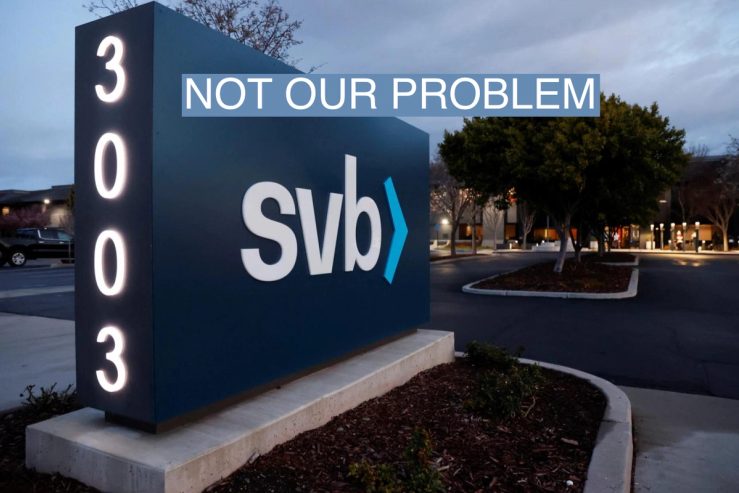The News
Anxiety among African tech investors and founders over the collapse of Silicon Valley Bank last week drew attention to African startups’ reliance on banking relations abroad and increased consideration for home-grown solutions.
As SVB’s troubles appeared to spiral late last week and through the weekend, African founders and some of their backers were starting to panic about their portfolio companies’ deposits at a bank known for catering to half of US startups’ savings and credit needs for 40 years.
As fears grew, Chipper Cash, a pan-African fintech valued at more than $1 billion, had to put out a statement assuring the market it had “only about $1m” in SVB but that it had “absolutely no impact” on its business. SVB’s investment arm led a $100 million round in Chipper in 2021.
“Only about 4 or 5 of our 100-plus companies had accounts at SVB,” Zachariah George, managing partner of Launch Africa Ventures, told Semafor Africa. His firm alerted companies in their portfolio on Thursday (March 9) to transfer money out of SVB as soon as possible, he said.
In African tech WhatsApp groups across the continent, there was also a call for calm about the relatively limited exposure to a bank with a mixed report card when it comes to African startups. In public, some investors like Future Africa’s Iyin Aboyeji spoke highly of SVB’s relationship with African tech, but others noted that African startups were less exposed because the bank had not always been welcome to opening accounts for them.
“Most startups in Africa use Brex or Mercury,” one investor who did not want to be named told Semafor Africa. But even Mercury has had a curious relationship with African startups; it restricted at least a dozen accounts last year, without notice.
Investors now say African banks offering dollar-denominated accounts could become a credible complement to banks overseas.
“It’s a perfect time to advance the Nigerian international finance center agenda,” Aboyeji told Semafor Africa, referring to a Nigerian central bank plan that would make it easier for local companies to bank in foreign currencies. Introduced in 2021, it has not taken off while similar initiatives have started in Rwanda, and Kenya.
Alexander’s view
African startups keep the bulk of their money in US banks to prevent the effects of local currency devaluation and regulatory uncertainty at home, while staying close to global sources of capital.
For example Y Combinator, the startup accelerator in California, asks all participants of its winter and summer programs to incorporate in the US state of Delaware and open bank accounts in the country. More than 80 African startups have been backed by Y Combinator since francophone mobile money app Wave opened the gate in 2012.
But SVB’s sudden crash and the potential for rapid contagion in the US financial system shows the approach comes with some risk.
In a bank failure where a startup does not transfer enough money into accounts in their base of operations, it could run into difficulties paying salaries, vendors or managing other essential expenses. Layoffs could be an immediate consequence. When your company’s bank is in crisis, “you need to know the people in your business who are essential to its survival,” as Onyeka Akumah, chief executive of Nigerian bus-hailing company Treepz, said, detailing lessons learned from the SVB scare.
Some of Africa’s largest commercial banks in Nigeria, Kenya and Rwanda offer foreign currency (sometimes called ‘domiciliary’) accounts for deposits in currencies other than the local naira, shillings, or francs. Saving in such accounts would provide startups the benefit of the US dollar’s stability while ensuring that working capital is close to home in peacetime or emergencies. “It is easier to manage systemic risk in your own international financial center,” Aboyeji said.
Room for Disagreement
The prospect of African startups banking in Africa faces its own challenges. “I mean just sending a wire from the US to a startup’s Nigerian domiciliary account was problematic as the corresponding bank held up the wire and kept asking all kinds of questions,” Eghosa Omoigui, managing partner at EchoVC Partners, told Semafor Africa.
“Are the African banks even trusted by their correspondent banks? What is the equivalent of the Federal Deposit Insurance Corporation’s insurance for domiciliary accounts,” he asks.
The View From Cape Town
Justin Stanford, a venture capitalist at the South Africa-based investment firm 4Di Capital, spent the end of last week advising portfolio companies that either tried to move their money to the UK or to personal accounts with Bank of America or JP Morgan Chase, he said.
While conceding that banks like Investec in South Africa, and AfrAsia in Mauritius offer international banking, Stanford said there are not many African banks “well geared” to serve startups’ needs.
“I definitely think there will be some movement towards some of these types of operators, with the offshore type jurisdictions potentially being attractive. They are not easy to sign up with, however, the friction is still high,” Stanford told Semafor Africa.
One other consideration for African businesses — particularly tech startups with many international commercial relationships — is that many African countries like Nigeria and Kenya have exchange controls or capital controls. This makes the free flow of money in and out of the country a challenge, said Stanford. “A lot of African tech startups are regional or multi-country, so again it just makes sense to use one common denominator which is freely transferable anywhere in the world.”
Notable
- Rising interest rates and a post-COVID-19 rebound were favorable to South African banks last year, Reuters reports. Standard Bank Group, which doubles as the continent’s largest bank by assets and its largest lender, posted a 33% increase in profit for the year ended Dec. 31, 2022.
- Standard Bank plans to buy a bank in Kenya by 2025 to be a market leader in the country, according to Bloomberg. Like in Nigeria, it already operates a subsidiary called Stanbic Bank in Kenya.


